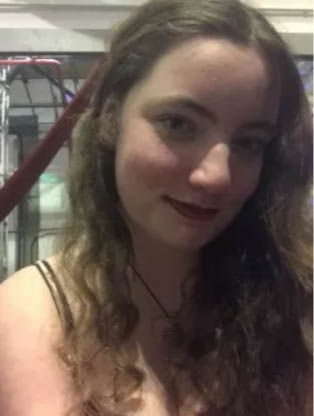
They are seizures, but they aren’t epilepsy. They’re called by many names: psychogenic non-epileptic seizures, non-epileptic attack disorder, dissociative seizures, stress-induced seizures, pseudoseizures. They’re not epilepsy, but they do cause upheaval in education, employment, relationships and independence. They’re ranked in the top three neuropsychiatric problems worldwide.
Nina Pye was a college student in the United Kingdom when she began collapsing. After months of tests and frustration, she learned she had psychogenic non-epileptic seizures. That wasn't the end of the story; it was only the beginning.
Here's Nina.
Nina Pye:
They started sometime in January 2015; I was at college doing performing arts. I can remember the first one. I was in a dance class and all of a sudden my heart started racing for no reason. You know how you get when you’re anticipating something and you’re kind of a bit nervous about it — you get a heart-racing feeling and it doesn’t feel good? I got that, and it was weird because there was nothing making me anxious; I love dance. There was no reason for me to feel like this. It felt like all the energy drained from my body. I felt like I was going to faint, but I didn’t feel faint, and I fell to the floor. I stayed there unable to move for a few seconds, and then I got back up again. It was so weird because I didn’t actually faint, and I’ve never fainted or had anything like that so I was like what happened? Did I lose my balance? It felt like I should have had control over it.
I just got back up again, no big deal was made and I carried on. Something like a week or two later I fell down again, and this time I stayed down. I remember lying there unable to get up. I could hear everything going on around me but it felt very distant. I felt like I was slightly outside of my body — it was a really weird feeling. And I’m thinking “What’s going on?” I don’t feel like anything is seriously wrong with me, it’s just that my body wants to get on the floor for a while. It’s like spontaneous lying down, except I fall.
This happened a few times and each time it got longer and longer and eventually it got long enough that my college called an ambulance.
My dad had died in 2013 and it was all quite fresh and new for me. I was schooled at home until college, and I didn’t have a good relationship with my father. He was abusive. Despite that, I was close to my parents, so when he died it was surreal and I didn’t find a way of dealing with it. And my mum was ill as well, she had terminal cancer, so there was a lot of stress in my life at that point.
When these attacks happened, I assumed they were some kind of stress reaction. I didn’t necessarily deal with things emotionally, so it would come out in a lot of physical issues, like stomach cramps, eating issues, anxiety, depression. So when this started happening I jumped to the conclusion that it was stress and probably nothing.
When I went to the hospital, they started running tests. At first they thought it was my heart; they did the 24-hour monitor and all of that. They didn’t jump to seizures or epilepsy because it was just a faint, a collapse, there was no seizure-like activity.
After the first couple of hospital visits, my experience with hospitals completely changed. The more often it happened, they just… paramedics assumed I was faking and was doing this as a cry for attention. I didn’t know what to feel. I wondered, “Is there something wrong? Am I putting this on and not knowing it?” They found nothing physically wrong. I was a bit malnourished but that was it.
It went on for a couple of months before I told anyone else; I didn’t even tell my mum until they started getting more frequent and other people started seeing it happen.
I was passed around from cardiologist to neurologist, went for all of these tests. It was a strange time because I’d never had anything like this. I’d had back surgery for scoliosis but this felt different and weird and concerning. They were talking about did I have a brain tumor, heart issues, all that.
I started to shake when I went down and have spasms, and so they thought maybe I had epilepsy. This carried on for a few more months and I kept ending up in the emergency room, and some medical staff treated it seriously and others said oh she’s faking, it’s just an attention thing. I had paramedic after paramedic saying “This is what some people do — they find a thrill in having ambulances called for them.” I had paramedics ask me, “Don’t you realize we have actual lives to save?” Yeah, I do know that, I’ve lost a parent, I know what ambulances do. Do you think I want ambulances called for me? I know it’s not life threatening but I can’t help it. I can’t tell people that I don’t need an ambulance because I don’t know when these are going to happen.
I went to stay with my family three or four months after these started. I had a seizure while I was there and ended up going to a hospital in London. Because my family saw it, they pushed to get a diagnosis and were doing research to try to figure out what it was. We discovered cataplexy and narcolepsy, and the symptoms fit.
So I went to a private neurologist who referred me to a sleep center. Everything came back inconclusive; they said I had mild sleep apnea and that was it. But, I had a seizure there and they had a visiting neurologist and he saw it, and he said “Yeah, you have dissociative seizures. It happens to a lot of people who’ve had something psychologically traumatic in their life, or PTSD.” I suffer from PTSD. So when I found this out, I felt relieved but ashamed as well. I thought, “Oh, it really is all in my head then.” I judged myself. It didn’t help that they are called psychogenic seizures. I felt very misunderstood.
I ended up homeless for a time, not because of the seizures but because of the breakdown in the relationship with my mum. I was kicked out of college because they couldn’t deal with the seizures, which I didn’t think was possible, that you could be kicked out for something you had no control over.
It was a pretty dark time in my life. A few other things happened, and it was one thing after the other. Around mid-2015 it got so bad that I made attempts to end my life three times in one month. Then my family started to take me seriously and realized I was really unwell, both mentally and physically. They took me back to London to live with them. It was a relief because I didn’t have to live in a homeless unit, which was horrible. I had no money, couldn’t work, couldn’t go to college and I thought this was my life sentence, this strange condition that had just happened and had no cure. I couldn’t get on with any antidepressants, they caused me so many side effects that I couldn’t take them. There was no support, there was no counseling. Everything that I was referred to never happened. I got 6 weeks of cognitive behavioral therapy (CBT) and that was the only proactive treatment I had for my seizures.
At my worst point I had 20 seizures a day. I was banging my head on doorframes or floors, I was collapsing in the middle of roads, grazing my legs and my elbows. How I escaped without broken bones I don’t know.
Everywhere I went, there was such a lack of understanding.
Later in 2015, the seizures began to ease up. I’d had my CBT by then and was beginning to deal with issues that had arisen from my father dying, and my PTSD was beginning to get a little better. I was able to have unbroken nights of sleep without awful dreams, and have a normal day, and go out and get some independence. It started to feel like “Okay, this is something I can work through and get over.”
I qualified as a level 1 cricket coach; my uncle was involved in cricket coaching and I was looking for something to do, just anything, and I love sports and working with kids. That was amazing and because I was really into dance, I managed to teach the kids to dance. I had roomfuls of these 8, 9, 10-year-old boys who wanted to just play cricket and football — I had them dancing.
I started making progress, and once I started it accelerated really fast. Looking back, now that the seizures have come and gone and come back again, I don’t think it was necessarily good that they went away so quickly, because I don’t think I found a way of dealing with them — I just found a way to suppress them. So while I made a huge amount of progress and I was able to dance again and have some independence, there was a lot I hadn’t dealt with.
I joined a dance troupe that my cousin was running. It’s not really something that most people would consider doing for seizures but I did that for about four years. I just recently left. I think the dancing helped me deal with some of the stuff I’ve been through – it worked as therapy for me. And the traveling we got to do and all of it, it pushed me out of my comfort zone and gave me mental strength. I made close friendships with the other people in the band and became very close with my cousin, and things were going quite well.
And then in May 2016 my mother passed away from her fight with cancer.
2017 I think was probably my best year, despite everything; I was moving house and traveling and dancing. There was a lot of stress as well, though, and I wasn’t really dealing with the fact that my mother had died. I was just engrossed in the practical matters and not dealing with the emotional side of things. So by the end of 2017, the seizures were creeping back into my life again.
In 2018 there was a lot of stress, things going wrong, breakdowns in relationships. But it kind of prompted me to go okay, this time I really want to do it right – I want to find the root of what makes me have a seizure and deal with it so that they don’t come back at all.
It didn’t really happen like that. Other things got in the way.
In September 2018 I returned to education. As well as dance, my other passion is medicine; I’ve always been interested in medicine and wanted a career in it. I enrolled in an access to university course, which is quite intense – it fits two A-level years into one year. At the enrollment day I told the school that look, I have seizures and they’re reasonably under control, but they will happen from time to time. They said okay, that’s fine, and set up a treatment plan with me.
It’s not just the seizures, it’s the anxiety and brain fog and the general feeling of exhaustion when you’re fighting against your own body.
Unfortunately my grandfather passed away at the beginning of this year; he was like a second father to me, although recently we weren’t as close. I kind of pushed him away because I couldn’t deal with any more family issues. But it has still been a great loss for me, and the repeated pattern of not really dealing with it and pretending everything is fine has not really worked for me.
Now, seizures happen about once a week. Sometimes I can go a few weeks without having one. I’m hoping to build up to the point where I can go many months without one, but I think that will take some time. I want to not repress anything and deal with everything properly.
The past few months I’ve reached out to other people online who are going through similar things. I thought I was alone and this was such a rare condition and little understood, but I found groups of people going through the exact same thing. They had the same experiences with the medical profession and the lack of understanding. Some people who were trying to have jobs and support themselves, some trying to get through university and support themselves. They experienced the issues in relationships, and just how hard it is generally to cope with. However hard it is for anyone else to cope with, it’s harder for us; we can’t get away from it.
I wish there was more knowledge and understanding about the difference between epileptic and non-epileptic seizures. I wish medical professionals especially knew the difference and the right ways to treat people. They kind of have two extremes: Treat it like epilepsy, which can be dangerous if you’re given medication for epileptic seizures, or the other extreme of there’s actually nothing wrong with you, which is unfair.
It’s in interesting journey I’ve been on and the seizures are just a small part of it, but I feel very strongly about raising awareness about them and finding ways to get people to be more supportive and more help to be available and more understanding, more knowledge for people who suffer with these seizures and their families, friends and carers. Doctors and paramedics should know about this and should have training. I feel like it’s so inadequate, considering how many people suffer with these seizures and how many are initially diagnosed with epilepsy and then find out they’re non-epileptic seizures.
In truth, it helps to have doctors who are “people people” – they like people, they get on with people. You have to face people all the time, and you have to face people on their worst day. They’re having the worst day of their live when you see them, especially in hospitals and emergency departments. It doesn’t take too much to just show a little bit of understanding.
I know there are people who abuse the system. I know there are fakers, I know there are drug abusers, but at the end of the day, they’re ill too. It’s a different kind of ill. Everyone is ill, but if someone is going to all the trouble of faking something or going to all this trouble to get drugs, there’s something there that needs to be treated too.

